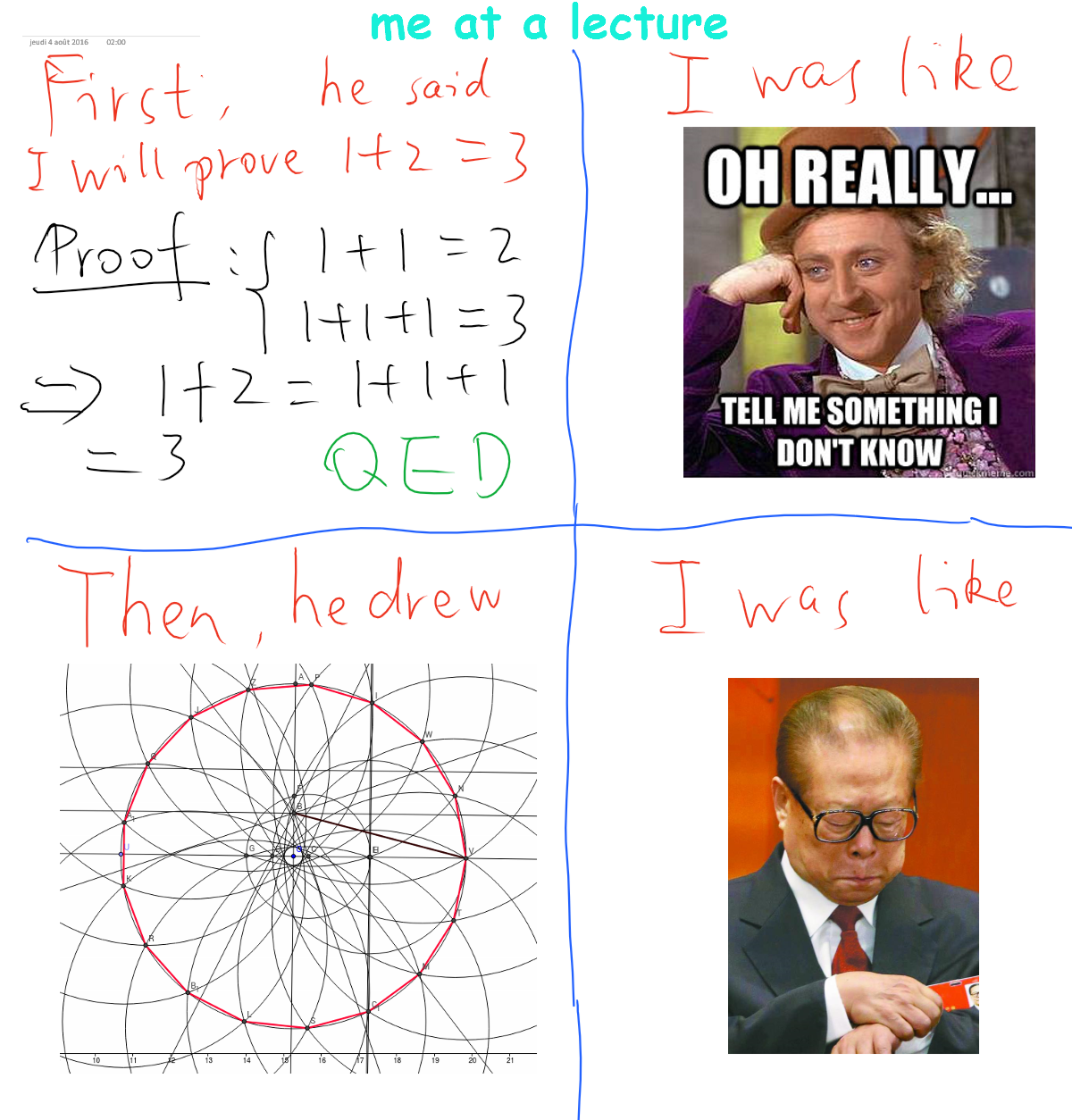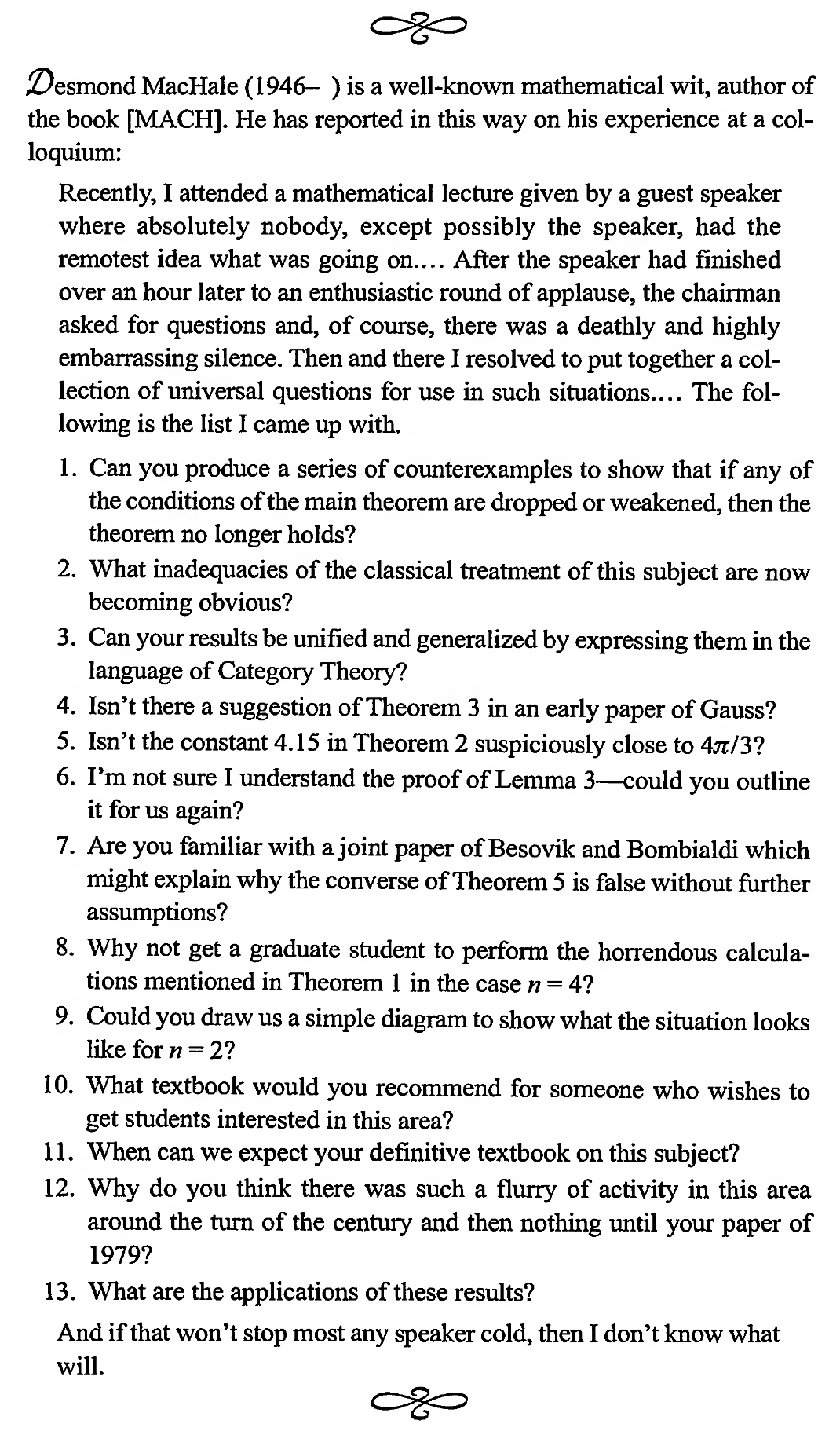如何假装听懂一次讲座并威震全场

你总会听到这样一些报告,听完之后,你完全不知道演讲者究竟在台上干了些什么。有时候你会被铺天盖地的细节给淹没,这个符号什么意思,那个定理是什么意思;有时候你会陷进一个似乎完全就没有出路的迷宫,这个迷宫的名字演讲者说走直线就能走出去,迷宫的名字就叫做“显然”;有时候你什么也听不明白,甚至标题都不明白是什么意思,你盯着标题看,直到你发现你已经不认识标题上的字母了;有时候你会忍不住问这到底搞的是什么东西,搞这个有什么用,搞这个能找到女朋友吗。总而言之,ta讲完之后,你听到了雷鸣般的掌声,ta问到有没有问题的时候,你听到死一般的沉默。这时候,你会问自己一个很深刻的问题,如何假装能听懂?
好了下面开始转载Mathematical Apocrypha Redux(Steven G. Krantz)的一篇文章。见第42页。
Desmond MacHale (1946- ) is a well-known mathematical wit, author of the book [MACH]. He has reported in this way on his experience at a colloquium:
Recently, I attended a mathematical lecture given by a guest speaker where absolutely nobody, except possibly the speaker, had the remotest idea what was going on…. After the speaker had finished over an hour later to an enthusiastic round of applause, the chairman asked for questions and, of course, there was a deathly and highly embarrassing silence. Then and there I resolved to put together a collection of universal questions for use in such situations…. The following is the list I came up with.
- Can you produce a series of counterexamples to show that if any of the conditions of the main theorem are dropped or weakened, then the theorem no longer holds?
- What inadequacies of the classical treatment of this subject are now becoming obvious?
- Can your results be unified and generalized by expressing them in the language of Category Theory?
- Isn’t there a suggestion of Theorem 3 in an early paper of Gauss?
- Isn’t the constant $4.15$ in Theorem 2 suspiciously close to $4\pi/3$?
- I’m not sure I understand the proof of Lemma 3—could you outline it for us again?
- Are you familiar with a joint paper of Besovik and Bombialdi which might explain why the converse of Theorem 5 is false without further assumptions?
- Why not get a graduate student to perform the horrendous calculations mentioned in Theorem 1 in the case $n=4$?
- Could you draw us a simple diagram to show what the situation looks like for $n=2$?
- What textbook would you recommend for someone who wishes to get students interested in this area?
- When can we expect your definitive textbook on this subject?
- Why do you think there was such a flurry of activity in this area around the turn of the century and then nothing until your paper of 1979?
- What are the applications of these results?
And if that won’t stop most any speaker cold, then I don’t know what will

好了,现在你已经能够假装听懂一个讲座了,应该说现在你已经可以装作很厉害的样子了。下面是时候震慑一下演讲者了。
费曼还是一个青椒的时候开了个讲座,打算搞个大新闻。那天爱因斯坦在开讲很久后悠闲地走进了费曼那个教室。那一瞬间,费曼见到了上帝,哈利路亚,生命是如此的美好、生命是多么的辉煌。不久之后爱因斯坦就出去了。一切美好的事物终究有个尽头,所有坚固的东西都烟消云散了。费曼开始怀疑自己,开始怀疑人生。我从哪里来,我往哪里去。我为什么在这里,我在这里干什么,我怎么还不滚下去。就在这深度思考中,费曼陷入了一种神奇的混沌状态,突然,下课铃响了。他顿时醒了过来,马上就问旁边的人,啊,爱因斯坦一定是觉得讲得太糟了。人家答曰:爱因斯坦听说这教室有甜点,所以进来尝了尝,然后就走了。
上面的例子或许是出自Surely you are joking, Mr. Feynman。我记不太清楚了。总而言之,你知道震慑演讲者是一种什么样的境界了。现在问题来了,震慑全场是一种什么样的境界?
爱因斯坦吓唬青椒还是很厉害的,不过比起Pauli来,毕竟爱因斯坦的手段还是Naive了点。传说暴君Pauli所到之处,众生以及众不生都会在某种神秘的强大气场之下出现莫名其妙的故障。比如,汽车会神秘抛锚,回旋加速计会神秘着火。这一现象史称Pauli效应。在Wikipedia上有详尽的记载。这就是震慑全场的境界了。
是的,标题是一个click bait。我没有告诉你怎么震慑全场,因为我不会啊。正如相信传递成功学的人多半是loser一样(所以我打算创立一门叫失败学的学科,做一个失败学的大使),你要相信我没有震慑全场过。